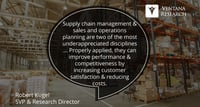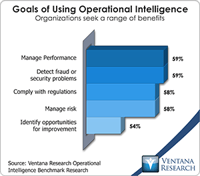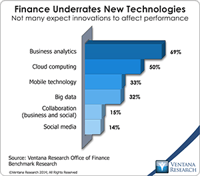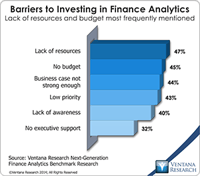From my perspective, supply chain management (SCM) and sales and operations planning (S&OP) are two of the most underappreciated disciplines of modern corporate management. Properly applied, they can improve performance and competitiveness by increasing customer satisfaction and reducing costs. A combination of more capable information technology with advances in operations research and analytics has made managing supply and demand chains potentially more impactful by making them more flexible...
Read More
Topics:
ERP,
Kinaxis,
Supply Chain Planning,
Analytics,
SCM,
S&OP,
Sales and Operations Planning,
supply chain management,
procurement
SYSPRO is a 35-year-old ERP vendor that focuses on products for midsize companies, particularly those in manufacturing and distribution. In manufacturing, SYSPRO supports make, configure and assemble, engineer to order, make to stock and job shop environments. The company attempts to differentiate itself through vertical specialization and its years of ongoing development, which can reduce the need for customization and cut the cost of initial and ongoing configuration to suit the needs of...
Read More
Topics:
Performance Management,
ERP,
Human Capital Management,
Office of Finance,
Operational Performance Management (OPM),
Reporting,
cloud ERP,
container,
Analytics,
Business Analytics,
Cloud Computing,
Collaboration,
Dashboards,
Business Performance Management (BPM),
Financial Performance Management (FPM),
Supply Chain,
Supply Chain Performance Management (SCPM),
SCM,
S&OP,
Digital Technology
FinancialForce’s 2014 summer release incorporates improvements in mobile and collaboration features and provides enhancements to the planning dimension of its professional services automation (PSA) suite. In the last couple of releases the company emphasized expansion in the functional capabilities of its ERP suite, as I noted, focusing on human capital management and professional services automation as well as some supply chain automation capabilities.
Read More
Topics:
SaaS,
Sales,
Salesforce.com,
Social Media,
ERP,
HCM,
Human Capital,
Office of Finance,
Consulting,
distribution,
PSA,
Unit4,
Analytics,
Cloud Computing,
Business Performance Management (BPM),
Financial Performance Management (FPM),
FinancialForce,
HR,
Sales Performance Management (SPM),
Professional Services Automation,
SCM
When it comes to making a business case for software investments, many people fail to recognize that the case itself is just one part of what amounts to an internal sales and marketing effort that they must perform well to be successful. Focusing only on the numbers and assumptions in a spreadsheet is not enough. Making a successful business case requires an understanding of the audience’s perspective and motivations. Since the individuals who will review the business case may not be...
Read More
Topics:
Planning,
ERP,
Office of Finance,
Operational Performance Management (OPM),
Research,
budgeting and planning,
ROI,
Analytics,
Business Performance Management (BPM),
CFO,
CRM,
Customer Performance Management (CPM),
Financial Performance Management (FPM),
Sales Performance Management (SPM),
Supply Chain Performance Management (SCPM),
business plan,
capital spending,
Financial Performance Management,
FPM,
SCM,
Software
FinancialForce recently introduced FinancialForce ERP, a family of cloud-based software designed to support a variety of customer-centric businesses such as professional services organizations or companies that specialize in business and industrial distribution. Many of these types of businesses are midsize or small (having 50 to 1,000 employees) and can benefit from the integration of FinancialForce’s accounting, professional services automation, human capital management (HCM) and supply chain...
Read More
Topics:
SaaS,
Sales,
Salesforce.com,
ERP,
HCM,
Human Capital,
Office of Finance,
Operational Performance Management (OPM),
Consulting,
distribution,
PSA,
Unit4,
Analytics,
Cloud Computing,
Business Performance Management (BPM),
Customer Performance Management (CPM),
Financial Performance Management (FPM),
FinancialForce,
HR,
Sales Performance Management (SPM),
Supply Chain Performance Management (SCPM),
Workforce Performance Management (WPM),
Professional Services Automation,
SCM
SAP is planning to acquire e-commerce company Ariba in a transaction worth about US$4.3 billion expected to close in the third quarter of this year. Ariba provides cloud-based collaborative business commerce through a Web-based trading community that enables companies to find, connect and collaborate with a global network of partners. Its Commerce Cloud is a platform that businesses can use to buy and sell goods. Currently, Ariba counts more than 700,000 companies worldwide attached to this...
Read More
Topics:
Big Data,
SAP,
ERP,
EDI,
end-to-end,
Analytics,
Cloud Computing,
Uncategorized,
CRM,
SCM
















